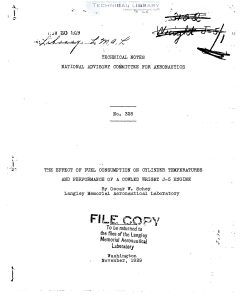naca-tn-328
- Version
- 187 Downloads
- 1.08 MB File Size
- 1 File Count
- November 4, 2016 Create Date
- November 4, 2016 Last Updated
National Advisory Committee for Aeronautics, Technical Notes - The Effect of Fuel Consumption on Cylinder Temperatures and Performance of a Cowled Wright J-5 Engine

This report presents the results of tests made by the
National Advisory Committee for Aeronautics to determine the
effect of fuel consumption on the cylinder temperatures and on
the performance of a cowled Wright J—5 engine. The tests were
conducted in the Committee‘s 30—foot propeller research tunnel
in conjunction with other tests to determine the effect of
cowling on drag, propulsive efficiency, cylinder temperatures,
and performance of the same engine mounted in the nose of a
cabin fuselage.
Sixty—nine iron—constantan thermocouples and three recording
pyrometers were used for obtaining measurements of cylinder toms
peratures. The engine power was measured by means of a torque
dynamometer mounted within the fuselage. The fuel consumption
Was computed from the time required to consume two pounds of
fuel.
The test conditions in the tunnel simulated those of full
throttle climbing on a hot day. A11 tests were conducted at
air speeds of approximately 80 m.p.h. Six different sizes of
jets, varying from No. 51 to No. 46 drill size, inclusive, were
used to vary the rate of fuel flow. The cowling used covered
73 per cent of the cylinder cooling surface. Slots were provid—
ed in the nose of this cowling to enable some of the cooling
air to flow inside of the cowling.
The cylinder temperatures obtained with the leanest mixture
were excessive, amounting; in some cases to almost SOOOF. En:
riching the mixture by varying the jet size from F0. 51 to No.
46 resulted_in a substantial reduction of cylinder temperatures
amounting to an average of lQBOF. at the rear spark—plug bosses
and 165°F. at the front spark—plug bosses. The tWO cylinders
which were shielded by the magnetos gave the greatest reduction
in temperature, amounting to 303OF. and 2540F. for the rear
spark~plug boss of cylinders Nos. 5 and 9, respectively. All of
the forty—seven points selected en'cylinder No. l shOWed some
reduction in temperature when the leanest mixture Was enriched.
Enriching the mixture to the extent obtained with the No.
49 jet resulted in an increase in power, but enriching the mix—
ture to the extent cbtained with Nos. 46 and 4? jets resulted
in a large reduction in power over that obtained even with the
leanest mixture.
| File | Action |
|---|---|
| naca-tn-328 The Effect of Fuel Consumption on Cylinder Temperatures and Performance of a Cowled Wright J-5 Engine.pdf | Download |

Comment On This Post